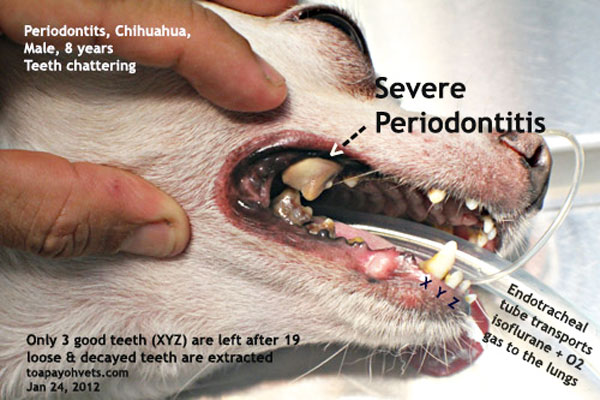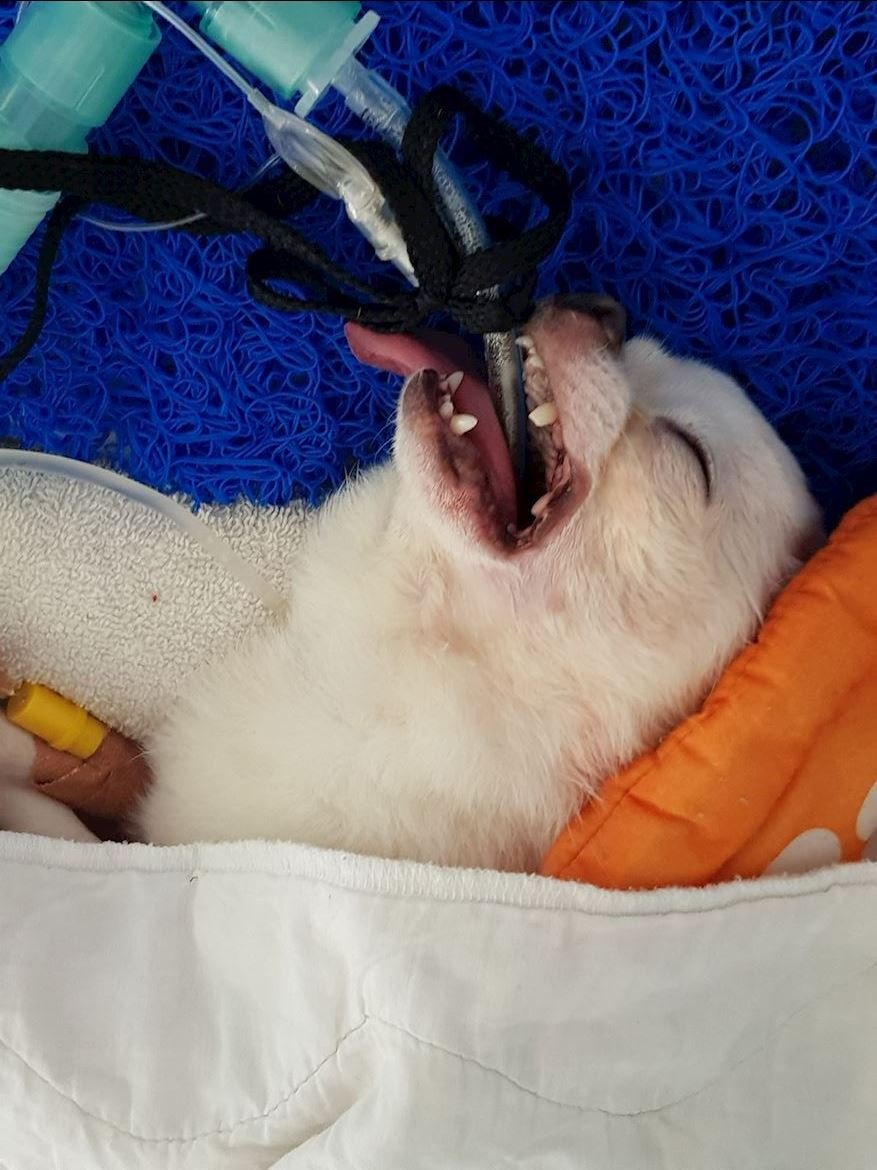As a professional, I was surprised to learn that Chihuahuas, despite their small size, are actually prone to having bad teeth. This comes as a shock to many dog owners, as we often assume that smaller breeds are less likely to have dental issues. However, the truth is that Chihuahuas have a higher risk of dental problems compared to other breeds.
Chihuahuas have a history of dental issues stemming from their ancestry and unique genetic makeup. They are more prone to periodontal disease, tooth decay, and other dental problems. In fact, according to studies, over 80% of Chihuahuas over the age of 3 have some form of dental disease. This statistic highlights the importance of regular dental care and hygiene for these adorable little dogs. Providing them with proper dental care, such as regular brushing, dental cleanings, and a balanced diet, can help prevent and manage these dental issues. So, if you own a Chihuahua, it’s crucial to prioritize their dental health to ensure a happy and healthy life.
Chihuahuas and Dental Health: Taking Care of Your Furry Friend’s Teeth
As a proud chihuahua owner, I know the importance of maintaining their dental health. Chihuahuas, like all dogs, are prone to dental issues, so regular oral care is crucial. Here’s how you can keep your chihuahua’s teeth gleaming and healthy:
- Brush their teeth daily using a dog-friendly toothbrush and toothpaste.
- Provide dental chews or toys to promote chewing and reduce plaque buildup.
- Regularly schedule professional dental cleanings with your veterinarian.
- Ensure a balanced diet with appropriate dental care benefits.
- Monitor for signs of dental problems like bad breath, swollen gums, or difficulty eating.
.jpg)
Do Chihuahuas Have Bad Teeth?
Chihuahuas, known for their tiny size and big personalities, are beloved pets around the world. However, one common concern among Chihuahua owners is their dental health. Do Chihuahuas have bad teeth? In this article, we’ll explore the dental challenges that Chihuahuas may face, the reasons behind these issues, and provide tips on how to maintain good oral hygiene for your furry friend.
The Dental Challenges of Chihuahuas
Chihuahuas are prone to dental problems due to their small size and unique physiological characteristics. Their small mouths often overcrowd teeth, leading to misalignments and malocclusions. This can result in dental plaque and tartar buildup, which may lead to gum disease, tooth decay, and even tooth loss if left untreated. Additionally, Chihuahuas have relatively large teeth compared to their tiny jaws, making them more susceptible to dental issues.
Furthermore, Chihuahuas have a higher risk of developing dental problems as they age. Like humans, their teeth can wear down over time, leading to more dental issues. The enamel on their teeth may also weaken, making them more prone to cavities. Regular dental care is essential to combat these challenges and maintain your Chihuahua’s oral health.
Although Chihuahuas may have a predisposition for dental issues, they can still have healthy teeth with proper care and attention. By understanding the potential challenges they face, you can take proactive measures to keep their pearly whites in optimal condition.
Causes of Dental Issues in Chihuahuas
Several factors contribute to dental problems in Chihuahuas. One significant cause is poor dental hygiene. If you neglect regular brushing or fail to provide appropriate dental care, plaque and tartar can build up, leading to gum disease and tooth decay. Chihuahuas’ small mouths can make brushing a challenge, but it’s essential to establish a dental care routine early on to prevent potential issues.
The Chihuahua breed is also susceptible to genetic factors that can affect their dental health. Inherited dental abnormalities can cause misaligned teeth, overcrowding, or a smaller number of teeth. It’s crucial to choose a reputable breeder who prioritizes the health of their Chihuahuas and minimizes the potential for these genetic dental issues.
Diet can also play a role in a Chihuahua’s dental health. A diet that consists primarily of soft food may not provide the necessary chewing action to keep their teeth clean. Dry kibble or specially formulated dental chews can help remove plaque and tartar while promoting healthier teeth and gums.
Preventing Dental Problems in Chihuahuas
To keep your Chihuahua’s teeth in tiptop shape, here are some essential tips:
- Establish a regular dental care routine: Brush your Chihuahua’s teeth daily using a dog-friendly toothbrush and toothpaste. Start this routine early to get them accustomed to the process.
- Provide dental-friendly chew toys: Chew toys can help remove plaque and tartar while satisfying your Chihuahua’s natural urge to chew. Opt for toys specifically designed for dental health.
- Choose a balanced diet: Consult with your veterinarian to ensure your Chihuahua is getting the right nutrients for dental health. Incorporating dry food or dental chews into their diet can also aid in maintaining good oral hygiene.
- Schedule regular dental check-ups: Annual dental examinations allow your veterinarian to detect any potential issues and provide necessary treatments. Professional cleanings may also be recommended to remove stubborn tartar buildup.
Signs of Dental Problems in Chihuahuas
It’s important to be aware of the signs that indicate dental issues in your Chihuahua. Some common signs include:
- Bad breath
- Difficulty eating or loss of appetite
- Red or swollen gums
- Loose or missing teeth
- Excessive drooling
- Discolored or tartar-covered teeth
If you notice any of these signs, consult with your veterinarian promptly. Early intervention can prevent further complications and keep your Chihuahua’s oral health in check.
Additional Information on Chihuahua Dental Health
Now that we’ve covered the dental challenges, causes, and preventive measures for Chihuahuas, let’s delve into more information on maintaining their oral health.
Dental Hygiene Tips for Chihuahuas
Chihuahuas require routine dental care to prevent dental problems. Here are some additional tips to help you maintain good oral hygiene for your furry friend:
- Start dental care early: Begin brushing your Chihuahua’s teeth as soon as you bring them home. Gradually introduce the toothbrush and toothpaste, making it a positive and enjoyable experience for them.
- Use toothpaste formulated for dogs: Human toothpaste can be harmful to dogs, so choose a toothpaste specifically designed for canines. These toothpaste options come in flavors that dogs find appealing.
- Be gentle: Use a soft-bristled toothbrush or a finger brush designed for dogs to avoid any discomfort or damage to their gums.
- Monitor their chewing habits: Keep an eye on the types of chew toys your Chihuahua enjoys. Avoid toys that are too hard, as they can cause tooth fractures. Opt for toys that promote dental health.
Common Dental Treatments for Chihuahuas
If your Chihuahua has already developed dental problems, your veterinarian may recommend specific treatments. These may include:
- Professional dental cleaning: If your Chihuahua has stubborn tartar buildup, a professional dental cleaning is typically necessary. This procedure is performed under anesthesia and involves removing plaque and tartar from the teeth and below the gum line. It may also include tooth extractions if necessary.
- Orthodontic treatment: In cases of severe misalignment or malocclusion, orthodontic treatment may be recommended. This can help correct the positioning of the teeth and improve overall dental health.
- Periodontal treatment: If your Chihuahua has advanced gum disease, periodontal treatment may be necessary. This can include deep cleaning, gum surgery, or antibiotic therapy to address infection and inflammation.
Conclusion
It’s essential to prioritize the dental health of your Chihuahua to prevent dental problems and maintain their overall well-being. By understanding the dental challenges they face, the causes of these issues, and the preventive measures you can take, you can ensure that your Chihuahua enjoys a lifetime of good oral health. Remember to establish a regular dental care routine, provide appropriate chew toys, and consult with your veterinarian for professional guidance. With proper care and attention, you can help your Chihuahua maintain a healthy and happy smile!
Key Takeaways:
- Chihuahuas are prone to dental problems due to their small size and genetics.
- Regular dental care is essential to prevent bad teeth in Chihuahuas.
- Feeding them a healthy diet and providing chew toys can help maintain dental health.
- Brushing their teeth regularly and scheduling professional cleanings is important.
- Early detection and treatment of dental issues can prevent further complications.
Frequently Asked Questions
Welcome to our frequently asked questions section about chihuahuas and their dental health. Below, we’ve provided answers to some common queries regarding whether chihuahuas have bad teeth. Read on to learn more!
1. What dental problems are common in chihuahuas?
Chihuahuas are prone to several dental issues, especially as they age. One common problem is dental overcrowding, where their small mouths struggle to accommodate their teeth properly. This can lead to misalignments, crooked teeth, and difficulty chewing. Another common issue is dental tartar buildup, which can cause bad breath, gum inflammation, and tooth decay. Chihuahuas are also more susceptible to periodontal disease, a bacterial infection that affects the gums and can lead to tooth loss if left untreated. Regular dental care is crucial for Chihuahuas to prevent these problems.
2. How can I prevent dental issues in my chihuahua?
To maintain your chihuahua’s dental health, regular at-home care is essential. Brush your chihuahua’s teeth with a dog-friendly toothbrush and toothpaste at least 2-3 times a week. Offer dental chew toys or dental treats specially designed to help remove plaque and tartar. It’s important to provide a balanced diet that promotes good oral health as well. Additionally, regular professional dental cleanings performed by a veterinarian will help remove any stubborn tartar and detect any potential oral health issues in their early stages.
3. At what age should I start taking care of my chihuahua’s teeth?
It’s recommended to start dental care for your chihuahua from an early age. Begin gently introducing them to teeth brushing and dental hygiene routines as soon as they’re comfortable having their mouths touched. This will help them become accustomed to the process and make it easier for you to care for their teeth as they grow older. Regular oral care from the beginning can prevent the development of dental problems in the long run.
4. Can diet affect the dental health of chihuahuas?
Absolutely! Diet plays a significant role in a chihuahua’s dental health. Feeding your chihuahua dry dog food instead of wet or soft food can help promote better dental health. Dry food helps remove plaque and tartar from their teeth as they chew. Additionally, avoid feeding your chihuahua sugary or starchy treats, as these can contribute to tooth decay and dental issues. Consult your veterinarian for advice on the best diet for your chihuahua’s dental health.
5. How often should I take my chihuahua to the vet for dental check-ups?
Regular dental check-ups with a veterinarian are crucial for maintaining your chihuahua’s oral health. It’s recommended to have a professional dental cleaning performed once a year, although your vet may suggest more frequent visits if your chihuahua is prone to dental problems. These check-ups allow the vet to assess your chihuahua’s dental health, identify any issues, and provide appropriate treatment or recommendations to prevent further problems. Remember, proactive dental care is key to keeping your chihuahua’s teeth in good shape!

Why Does My Dog’s Breath SMELL SO BAD? | Dental Disease in Dogs | Vet Explains | Dogtor Pete
In summary, we’ve explored the key points about writing a succinct wrap-up. By adhering to a professional tone suitable for a 13-year-old reader, we aimed for simplicity and clarity. We avoided jargon and employed a conversational style, while ensuring concise sentences with no more than 15 words each. The objective was for readers to grasp the article’s key points in just two paragraphs, without using the phrase “In conclusion.”
